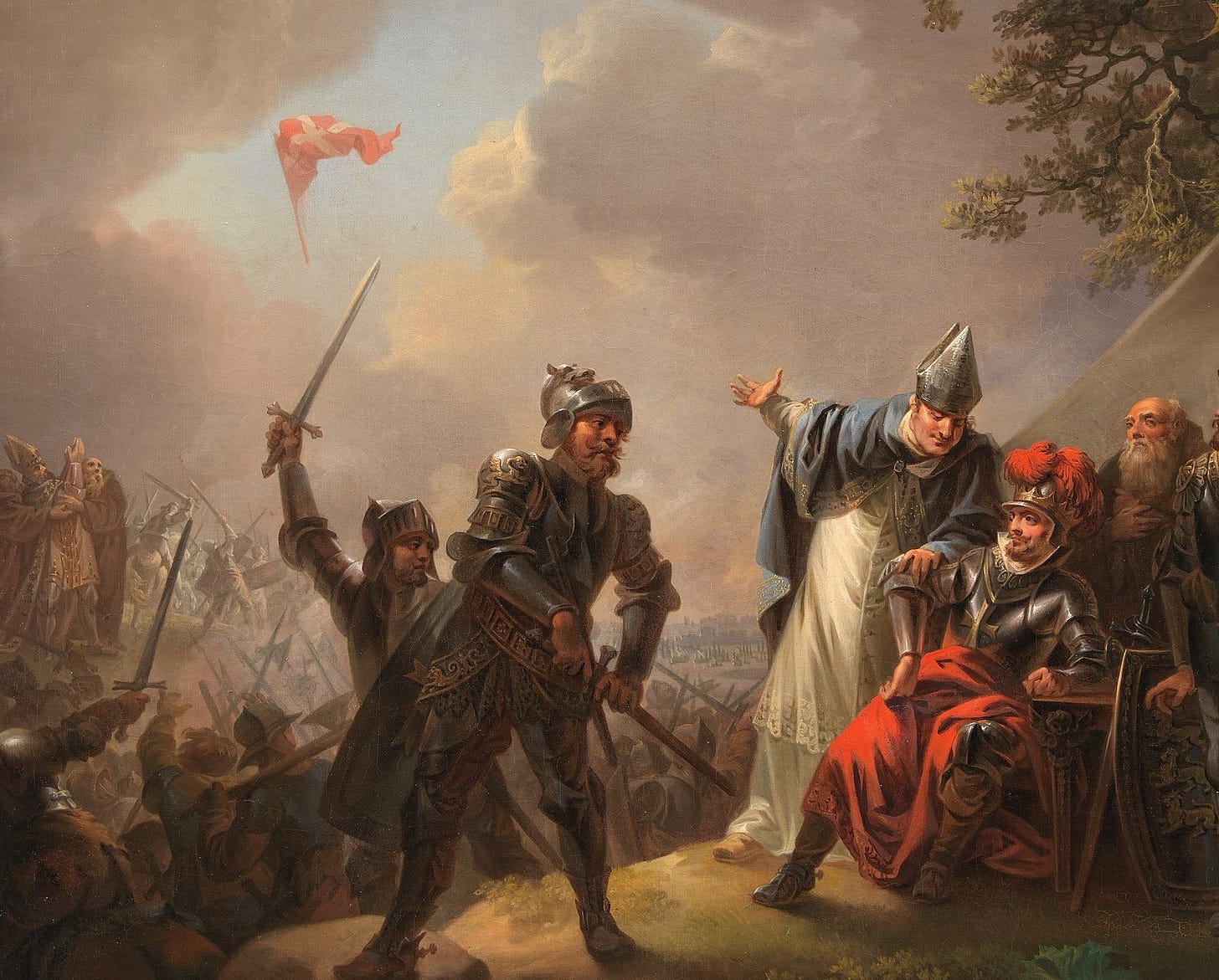Didn’t realize it is pride month when writing this. Happy coincidence, I guess :)
The world is filled to the brim with bigoted scum! Some rationalize slavery with skull-measurements, some want to disenfranchise our beautiful women, and some even reject shrimp’s rights (*cough cough*)! Worst of all, however, are the despicable dissenters of the self-ID view of gender—the view that you have whichever gender you identify as having.
Among their ranks are otherwise ostensibly decent people like
and .1 These stone-hearted ghouls wish death upon all trans people, often going so far as to deny their very right to existence. Despicable!I jest of course. Still, self-ID has often been pretty quickly dismissed in circles of people who try to think about things for being “circular” and “uninformative.” While not convinced that it's the best way to define gender, I think it has more potentially going for it than has otherwise been presumed, and I shall try to patch up its most fatal flaw.
First, an Aside
Attack helicopters, lol, LMAO! 🤣🤣😂
Very funny!
Now, the Post:
The canonical objection raised against the self-ID view is as follows: The definition uses the definiendum in the definiens. So “woman” means “someone who identifies as a woman.” However, if we explicate that, it becomes “someone who identifies as someone who identifies as a woman,” and I’m sure I don’t need to explain where this goes. So the definition is in no way informative!
Seems pretty decisive right? I’m not so sure, as I think there are genuine examples of successful self-ID identities. First a case study of one such, and then I'll try and explain how I think self-ID can avoid the above.
I.
I think I’m a Dane. Why? Because I identify as a Dane (and I mean national identity, not just citizenship here). What exactly do I identify as? I mean, don’t we just run into the same problem as before? When I introspect, it doesn’t feel like we do. What I identify as isn’t some group with a set of conditions for being a member—you must eat this food, be born here, know these songs, and be this tall—rather its just… that group. Being a Dane doesn’t have necessary and sufficient condition; it doesn’t even just boil down to family resemblance. No, being a Dane is a ✨V I B E✨.
Hopefully when you introspect you find something similar for [insert own nationality]. That is, you find that your national identity doesn’t have some object other than just that national identity. You might of course associate all sorts of cultural artefacts and practices with the identity, but none of that constitutes it. When I abstract away all that stuff, it just seems like there is this vague National-Identity-Entity that I identify as falling under, end of story.
Are there many such cases? Yeah! At least I think we can make up many. I hereby declare the group “Wonderers!” “Who is a Wonderer?” you ask. And I answer: “Anyone who feels like it!” There are no criteria other than just identifying as a Wonderer—no questions asked. Members of course share many characteristics, such as often being cool and being subscribed to Wonder and Aporia (which naturally implicate each other):
Was there anything incoherent about what I did there? I don’t think so! From now on, I can make perfect sense of the idea that we are Wonderers—it’s not that deep. Other examples might include certain kinds of sub-cultures, and perhaps friend groups.2
II.
Circling back to what we were actually here for, how do these examples avoid the circularity-accusation? I basically think the way that this escapes the argument is that the “Dane” of the definiendum isn’t the same sense as the “Dane” used in the definiens. The “Dane” I am is the type I belong to: Danes. But the “Dane” I identify as is this intangible vibe, that isn’t exactly anything other than just the feel of the group itself (I hope I’m not sounding crazy here, lol).
Likewise for women: The definiendum “Woman” is the category of women, whereas the “Woman” in the definiens is the vague womanish vibe that someone might feel themselves with.
The crucial question of course is: Is gender identity like these examples? I kind of think so, yeah. When I introspect, I feel like my gender identity is very phenomenologically similar to my national identity. Each might be manifested in things like my language or my dick, but the identity itself is different—it’s just a vibe of being a Dane or a man. I can’t really do more than just ask you to introspect and hopefully find the same to be the case for you.
One thing about these other self-ID categories is that they really actually do seem to have a substantive core beyond bootstrapping themselves into existence. Namely they’re defined by their history. At some point someone stipulatively said: “Let Denmark be, and let the flag fall down to us from heaven!”
That defined what it meant to be a Dane: Identifying as a This *points to the group just stipulated to exist*. But then there really is some content to the group: Namely being the group with such and such a history.3
But any social category will have a history. Doctors have a history, rock musicians have a history; heck, even Wonder and Aporia subscribers have a beautiful history. It might be unclear when Womanhood came into existence, but exactly the same is the case for old national identities like Danishness, so the parity holds. Basically, the criterion of having some history is extremely easy to fulfill.
III.
Due to my generosity and large heart, I’ll suppose that what I’ve argued doesn’t work. In that case I think
gets things basically right in saying that self-ID is a very good epistemic criterion for finding out who are women. What then actually makes someone a woman? If you have done the recommended reading of the blog, you’d know that I don’t think there’s a true answer here. Rather it’s just a question of who ought to count as women. This will be highly context-sensitive, but if I had to choose a single definition to use, I think it’d be something like this:X is a woman IFF X is a female and doesn’t have gender dysphoria, or X is not a female and experiences gender dysphoria “oriented towards” womanhood.
What exactly it takes to have gender dysphoria as specified here is the big question. This has of course been operationalized in clinical contexts, so that might be a good start. However, I suppose we’re really interested in the phenomenon that we’re trying to capture with the diagnosis, rather than the diagnostic criteria. I’m not sure exactly what it is people with gender dysphoria feel like they’re missing, and I take it that it varies from person to person. But I suspect that some kind of self-ID will end up being part of it; you can’t keep running from it.
Whatever it is they’re feeling, though, it surely can’t be circular—I don’t even know what it would mean for a feeling or desire to be “circular”—as people are actually having it, and experiencing a desire for something. Whether the dysphoria has the womanhood vibe or boobs as its object doesn’t much matter though, the point is simply that this definition does what it ought to do.
You Might Also Like:
Why Would You Disapprove of Transracial Identity? No Seriously, Why?
It seems like the most common attitude towards transracial people is that they are racists or lunatics or something. I think most of the people who have this attitude have it on irrational grounds.
While not obvious, friend groups might work if you take a deflationary ontology about groups. In that case there’s no entity “out there” which people fall under, but rather groups are just ways of talking or something. Then each person might have a different idea of the group in mind—that is, there is no single friend group across persons. So even if Jack and Jill don’t consider Johnny their friends, if Johnny does consider himself a part of the friend group, then he is a part of the Johnny’s-POV-friend-group. That means that being part of the X’s-POV-friend-group is simply a matter of X considering themselves a part of it—something I think is close enough to self-ID.
Well, most groups won’t have such a sharp beginning. Rather it will just slowly evolve naturally.









Something something I identify as being right about this argument something something attack helicopter etc.
Enjoyed this a lot, I actually don’t think our views are that far apart. I don’t disagree that the definition “A woman is anyone who identifies as a woman” can be non circular, either by equivocating on the sense of the word ‘woman’ (the path you suggest here) or by mentioning the second occurrence of woman such that it’s about identifying with the particular sign ‘woman’. The tricky thing is that I think the label of ‘woman’ has content, that is to say when I find out someone is a woman I learn a good bit about her, so we want some explanation of where that content comes from. Here’s where I think our views are actually similar because ‘vibes’ is basically what I take to supply the features of the cluster concept for gender on my view. The difference, I take it, between our views is then about the work that identification is doing.
I think the characteristic feature of the self ID view is that, so long as someone honestly thinks to themselves that they are a woman, they are as such. You give Dane as another example of a ‘self ID category’ but I don’t think it works. If John is a born and bread American, does not know danish or the history of Denmark or even where Denmark is on a map, but proclaims “I am a Dane!” with full honesty, he’s just wrong.
Putting it another way, I think these modified self ID views, if they are to remain self ID views, must have identification as a sufficient condition for inclusion in the category. But I don’t know of any category that works like this! At least not any seriously gerrymandered ones. There are also cases where people genuinely believed they were a woman, and weren’t. Take someone who detransitions, they at one point believe themselves to be a gender that they were not, and they believed that entirely honestly. Basically I think, aside from the logical issues, having mere identification as the sufficient criteria for gender gets you into a bunch of headaches where instead you should just look at whether or not people conform to the ✨vibes✨
I agree that self-ID can be noncircular, but you can't self-ID as a Dane! If don't live in Denmark and were not born in Denmark and do not have Danish ancestry, sorry, you're not Danish.
Nationality as vibes reminded me of this classic: https://www.youtube.com/watch?v=32G_BVb18MA